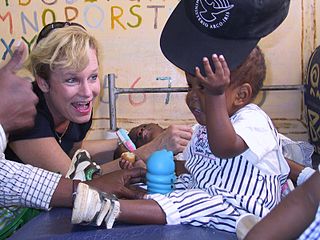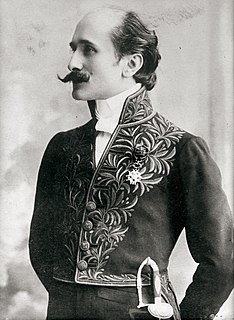A Quote by Henry David Thoreau
Life consists with Wildness. The most alive is the wildest. Not yet subdued to man, its presence refreshes him. One who pressed forward incessantly and never rested from his labors, who grew fast and made infinite demands on life, would always find himself in a new country or wilderness, and surrounded by the raw material of life. He would be climbing over the prostrate stems of primitive forest trees.
Related Quotes
When a man's life is over, it remains true that he was one sort of man and not another. A man who understands himself under the form of eternity knows the quality that eternally belongs to him, and knows that he cannot wholly die, even if he would, for when the movement of his life is over, the truth of his life remains.
How interesting it would be to write the story of the experiences in this life of a man who killed himself in his previous life; how he stumbles against the very demands which had offered themselves before, until he arrives at the realization that he must fulfill those demands. The deeds of the preceding life give direction to the present life.
The relationships of our present social life are so numerous and so interwoven that a child placed in the most favorable position could not readily share in many of the most important of them. Not sharing in them, their meaning would not be communicated to him, would not become a part of his own mental disposition. There would be no seeing the trees because of the forest. Business, politics, art, science, religion, would make all at once a clamor for attention; confusion would be the outcome.
He did not know that the new life would not be given him for nothing, that he would have to pay dearly for it, that it would cost him great striving, great suffering. But that is the beginning of a new story -- the story of the gradual renewal of a man, the story of his gradual regeneration, of his passing from one world into another, of his initiation into a new unknown life. That might be the subject of a new story, but our present story is ended.
I do believe that the outward and the inward life correspond; that if any should succeed to live a higher life, others would not know of it; that difference and distance are one. To set about living a true life is to go on a journey to a distant country, gradually to find ourselves surrounded by new scenes and men; and as long as the old are around me, I know that I am not in any true sense living a new or a better life.
I believe that Jesus would have given His life for just one person. Jesus emptied Himself, He humbled Himself and He so yielded Himself to His Father's love that He had no ambition of His own. He was not looking to build an empire, He did not want praise or adulation or to impress people with who or how many followed Him. He stopped over and over again for just one person, for just one life.
Wilderness is the raw material out of which man has hammered the artifact called civilization. Wilderness was never a homogenous raw material. It was very diverse. The differences in the product are known as cultures. The rich diversity of the worlds cultures reflects a corresponding diversity. In the wilds that gave them birth.
There came to him an image of man’s whole life upon the earth. It seemed to him that all man’s life was like a tiny spurt of flame that blazed out briefly in an illimitable and terrifying darkness, and that all man’s grandeur, tragic dignity, his heroic glory, came from the brevity and smallness of this flame. He knew his life was little and would be extinguished, and that only darkness was immense and everlasting. And he knew that he would die with defiance on his lips, and that the shout of his denial would ring with the last pulsing of his heart into the maw of all-engulfing night.
What a wee little part of a person's life are his acts and his words! His real life is led in his head, and is known to none but himself. All day long, the mill of his brain is grinding, and his thoughts, not those of other things, are his history. These are his life, and they are not written. Everyday would make a whole book of 80,000 words -- 365 books a year. Biographies are but the clothes and buttons of the man -- the biography of the man himself cannot be written.
A township where one primitive forest waves above while another primitive forest rots below,--such a town is fitted to raise not only corn and potatoes, but poets and philosophers for the coming ages. In such a soil grew Homer and Confucius and the rest, and out of such a wilderness comes the Reformer eating locusts and wild honey.
ROXANE: Live, for I love you! CYRANO: No, In fairy tales When to the ill-starred Prince the lady says 'I love you!' all his ugliness fades fast-- But I remain the same, up to the last! ROXANE: I have marred your life--I, I! CYRANO: You blessed my life! Never on me had rested woman's love. My mother even could not find me fair: I had no sister; and, when grown a man, I feared the mistress who would mock at me. But I have had your friendship--grace to you A woman's charm has passed across my path.
I often wonder: suppose we could begin life over again, knowing what we were doing? Suppose we could use one life, already ended, as a sort of rough draft for another? I think that every one of us would try, more than anything else, not to repeat himself, at the very least he would rearrange his manner of life, he would make sure of rooms like these, with flowers and light ... I have a wife and two daughters, my wife's health is delicate and so on and so on, and if I had to begin life all over again I would not marry. ... No, no!
What can you conceive more silly and extravagant than to suppose a man racking his brains, and studying night and day how to fly? ... wearying himself with climbing upon every ascent, ... bruising himself with continual falls, and at last breaking his neck? And all this, from an imagination that it would be glorious to have the eyes of people looking up at him, and mighty happy to eat, and drink, and sleep, at the top of the highest trees in the kingdom.
































